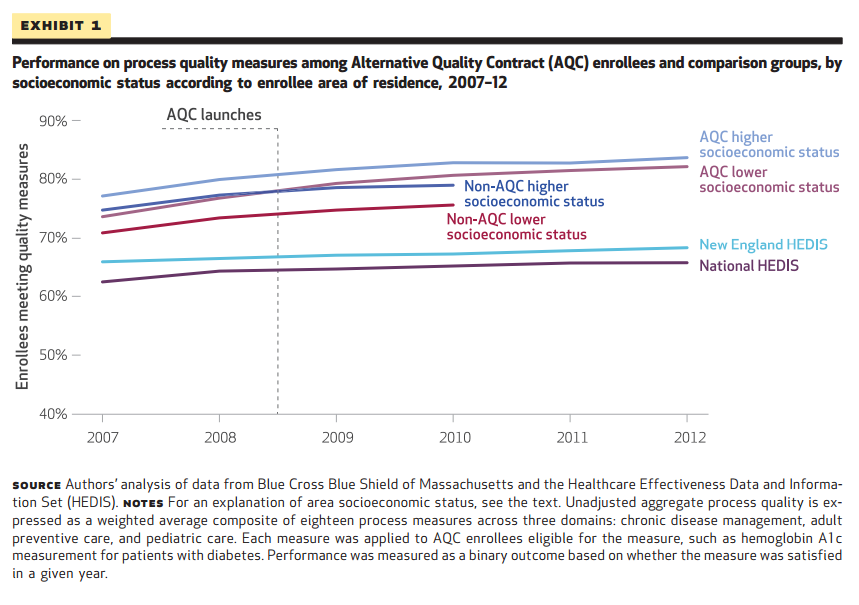What’s the latest in health policy research? The Essential Scan, produced by the Schaeffer Initiative for Innovation in Health Policy, aims to help keep you informed on the latest research and what it means for policymakers. To receive the Essential Scan in your inbox, sign up here.
Editors Note: The Essential Scan is produced by the Schaeffer Initiative for Innovation in Health Policy, a collaboration between the Center for Health Policy at the Brookings Institution and the USC Schaeffer Center for Health Policy & Economics.
ACOs with higher shares of minority patients have lower scores on 25 of 33 Medicare quality performance measures
Valerie A. Lewis, Taressa Fraze, Elliott S. Fisher, and co-authors find that accountable care organizations (ACOs) with higher shares of minority patients had similar clinical capacities as ACOs with lower shares, yet had lower quality scores on 25 of the 33 Medicare ACO quality measures. Some of the highest unadjusted disparities in performance included measures for flu vaccine uptake, aspirin usage, mammography screenings, and colorectal cancer screenings. While adjusting for patient risk factors and ACO capabilities lessened the gap in performance on measures such as the flu vaccine and the patient’s rating of the doctor, adjustment increased the gap for other measures including shared decision making, fall risk screening, and adult weight screening and follow-up. Notably, these disparities did not decrease from the first to second years of ACO participation. These findings raise questions about the tradeoffs to adjusting quality performance based on socioeconomic status for ACOs and other alternative payment models. Full article here.
Improved outcome and process measure performance under alternative quality contract

Zirui Song, Sherri Rose, Michael E. Chernew, and Dana Gelb Safran find the 2009 introduction of the alternative quality contract (a population-based global budget with two-sided risk) resulted in similar overall improvements in quality performance among providers in areas of both higher and lower socioeconomic status. At the same time, providers in lower status areas outpaced higher status area providers on process measure performance increases– an average of 1.2 percentage points higher after adjustment over the four years analyzed. Consequently, the performance gap on process measures closed while that of outcome measures remained. The findings of performance improvement across socioeconomic status areas highlight the impact sizeable risk-based contracts can have on performance-notably, the reform studied allowed for incentive payments up to four times more than other incentive programs-yet call into question the connection between performance on process measures and patients’ health outcomes. Full article here.
Chronic condition medication adherence 64% among PCMHs, compared to 59% in control practices

“Although medication adherence is a major challenge to medical care being effective, enthusiasm about the statistically-significant improvements achieved by the PCMH model needs to be tempered by the very modest degree of improvement.”
– Paul Ginsburg, PhD, Director of the Schaeffer Initiative
Julie C. Lauffenburger, William H. Shrank, Asaf Bitton and co-authors find that mean rates of medication adherence were higher among patients at patient-centered medical homes (PCMHs) than the control study- 64 percent versus 59 percent. Using the claims data of one national health insurer, the authors evaluated medication adherence over 12 months following treatment initiation for diabetes, hypertension, and hyperlipidemia from 2011 to 2013 among National Committee for Quality Assurance-approved PCMHs and propensity score-matched control practices in the same Primary Care Service Areas. The authors find that medication adherence for diabetes and hypertension had stronger associations with PCMHs than adherence for hyperlipidemia (difference in adjusted absolute rates of adherence 3.0, 3.2, and 1.5 percentage points, respectively). These findings broadly support the use of PCMH accreditation as a means of improving care quality and add national perspective to the literature surrounding PCMHs’ impact on patient health outcomes. Full article here.

You must be logged in to post a comment.